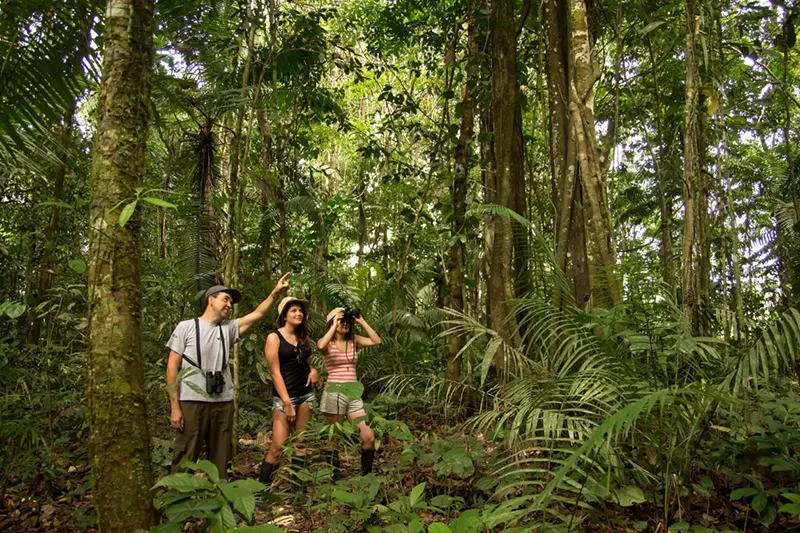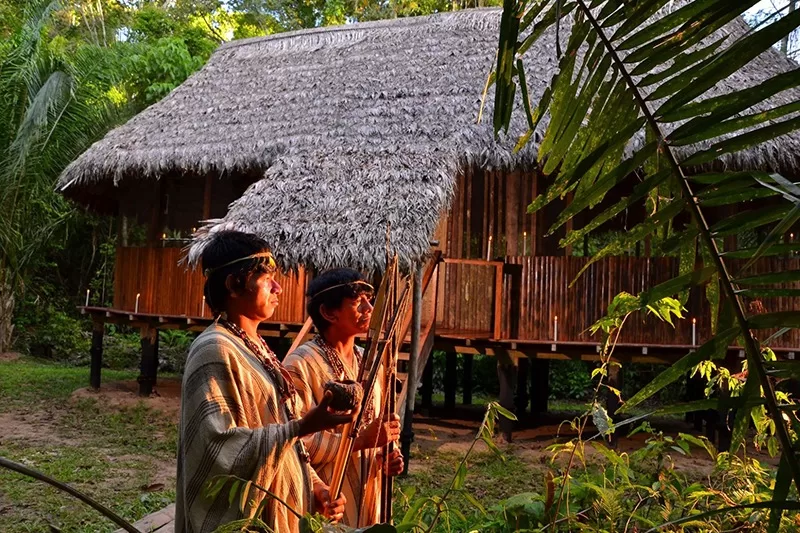The Amazon Rainforest, a marvel of biodiversity, beckons travelers worldwide. Ecotourism in the Amazon offers a unique, immersive experience. Yet, responsible practices are paramount to its preservation.
Understanding ecotourism’s best practices is essential for a sustainable journey. These practices ensure minimal impact on this delicate ecosystem. Moreover, they empower local communities and foster conservation.
Ecotourism in the Amazon emphasizes respecting nature and local communities. To truly protect the Amazon, travelers must be informed and conscious. This means adopting certain principles during their journey.
First, waste management is crucial. Travelers should minimize waste and carry reusable items. Using biodegradable products helps reduce environmental impact in the fragile ecosystem. Water sources in the Peruvian Jungle are precious. Therefore, using water sparingly and avoiding contamination is essential.
Respecting local cultures and traditions is a cornerstone of ecotourism. By supporting local businesses, visitors contribute to community development. Handmade crafts or guided tours by locals are great examples. Such experiences not only support locals but also enrich travelers’ knowledge.
Wildlife encounters are a highlight of Ecotourism in the Amazon. However, it’s crucial to observe animals without disturbing their habitats. This means keeping a safe distance and not feeding them. These practices help maintain their natural behaviors and protect the Amazon’s biodiversity.
Moreover, travelers should stay on designated paths. This reduces the human impact on untouched areas. It also prevents unintentional damage to plants or habitats. While the vastness of the Amazon may seem endless, each step can affect its delicate balance.
Lastly, educating oneself before the trip is crucial. Knowing about the challenges the Amazon faces can inspire better decisions. Advocacy plays a role too. Travelers can become ambassadors, sharing their sustainable travel experiences.
To genuinely enjoy Ecotourism in the Amazon, choosing responsible tour operators is vital. These operators prioritize the environment and local welfare. For those eager to delve deeper, consider a visit to the Peruvian jungle. Remember, every responsible action contributes to a brighter future for this magnificent rainforest.

Ecotourism in the Amazon is growing in popularity. Yet, with increasing footprints, the need for responsible travel is paramount. The majestic Amazonian Flora and diverse wildlife deserve protection.
Impact minimization starts with preparation. Prior to visiting, travelers should research eco-friendly lodges and tours. These accommodations often employ locals, ensuring community benefits from ecotourism. Additionally, using guides familiar with the region ensures less disruption to habitats.
It’s essential to stay on marked trails. Straying can damage plants and disrupt animal homes. Remember, the Manu Amazon Jungle is a delicate ecosystem. Every action, no matter how small, has consequences.
Limiting waste is another crucial aspect. Travelers should carry reusable water bottles and containers. Avoiding single-use plastics reduces litter, which can harm wildlife and flora. Moreover, disposing of waste properly preserves the beauty of the Amazon.
Ecotourism in the Amazon also means respecting its inhabitants. This involves avoiding loud noises and quick movements. It’s a privilege to observe wildlife in their natural habitat. Their space must be respected to ensure they thrive.
Travelers should also be cautious with the Amazonian Flora. Picking plants or flowers can disturb the ecosystem balance. Everything in the Amazon plays a role, even the tiniest leaf.
Lastly, supporting conservation initiatives is vital. Many organizations work to preserve the Amazon. By donating or volunteering, visitors can leave a lasting positive impact.
In essence, Ecotourism in the Amazon is about coexistence. It’s possible to enjoy the rainforest without leaving harmful traces. For those keen to witness nature’s marvels responsibly, the Amazon awaits. Every journey can contribute to its preservation.

Ecotourism in the Amazon is more than just nature appreciation. It plays a pivotal role in conservation, particularly through community empowerment. By supporting local ventures, ecotourism injects life into rural economies.
Local communities are the rainforest’s true custodians. They’ve coexisted with the Amazon for centuries. Thus, their knowledge is invaluable. When ecotourism involves them, conservation strategies align with indigenous wisdom.
Empowering these communities often begins with employment. Many lodges and tour companies prioritize hiring locals. This not only provides economic stability but also promotes cultural exchanges between visitors and hosts.
Moreover, community-led projects, funded by ecotourism, further bolster the Amazon’s protection. Villagers often undertake initiatives such as reforestation, wildlife protection, and anti-poaching drives. Their intrinsic bond with the land ensures conservation efforts resonate with deep respect and understanding.
Additionally, local crafts and produce often find an audience among tourists. This boosts local industry, reducing the lure of unsustainable practices like logging or mining. The message is clear: keeping the rainforest intact is more profitable than its destruction.
Yet, empowerment doesn’t end with economics. Education, facilitated by ecotourism, equips communities with tools for sustainable futures. Workshops on sustainable farming, conservation, and eco-business models pave the way for a brighter, greener future.
To truly immerse in the heart of the Amazon and support its guardians, consider a journey. The Manu Reserved Zone Tours offer a profound connection with nature. Alternatively, explore the depths of biodiversity with Manu Jungle Tours. Whichever path you choose, know you’re contributing to a grander conservation vision.

If you got any questions, please do not hesitate to send us a message. We reply within 24 hours!
+51 900 394 399
info@biomanuexpeditions.com
reservas@biomanuexpeditions.com
